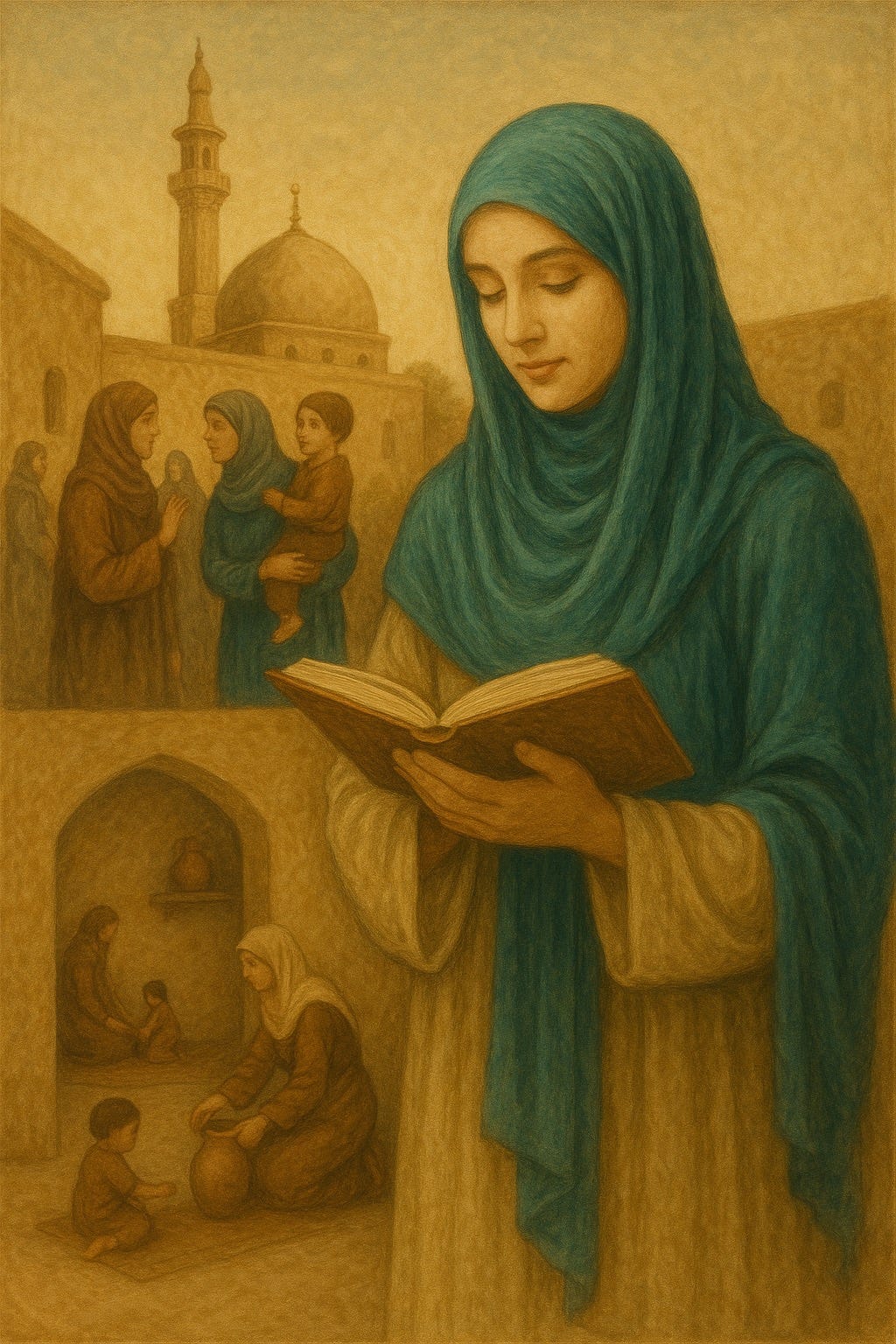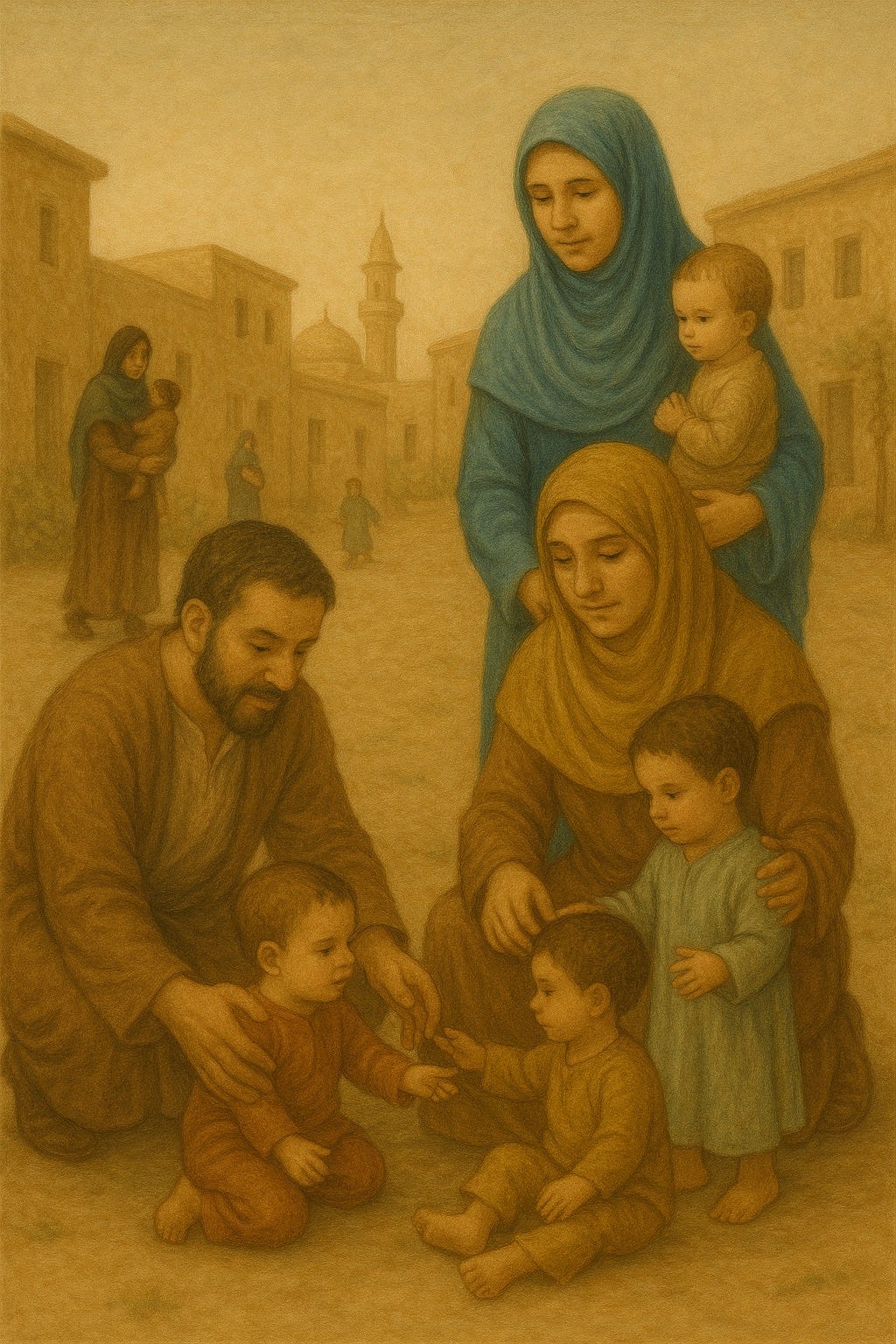The Role of Women Within Society and Within Her Home.
Beyond the Superwoman Myth: Rediscovering Women’s True Role in Islam
Women today in society at large are reared to behave like men and championed in becoming providers. They're told being wives, mothers, and homemakers are oppressive, restrictive, ‘This isn't God’s plan for us as women,’ they say, but the truth is, as women, nurturers — we were never created to be like men or have their responsibilities, or to compete.
Men and women are not the same, and neutralizing their fundamental differences has led to deep seated resentment and inner turmoil on both sides, especially within women. The benchmark of progress, success, and fulfillment has been determined by the society “outside”, in capitalist systems which generate wealth unfairly. Capital is the God of modern society and as such, the value of the human in such societies is measured on the basis of what they earn.
Ayatollah Khamenei (HA) once said:
“Even now women are paid less than men for doing the same work in many Western countries. Women are being misused. Under the pretext of women’s emancipation in the 19th and 20th centuries, women were pulled out from their homes to work in factories with lower wages.”
This society, in addition to forcing us into systems where we now live to work, the inequality they disguise as “independence”, has also sold us the false idea that we love it and we chose it willingly. It worked tirelessly to embed notions of success and fulfillment in the 20th century invention of careers. Now reintroduce gender into the picture and see how these systems have disproportionally oppressed and suppressed women and their true feminine creativity and capabilities.
A woman’s instinctual love and nurturing: gardens, humans, literature — and all forms of creative expression which are belittled insofar as they don’t generate hard cash. They sold her false values that correlated her usefulness with whether or not she receives a paycheck. Not only did capitalist greed oppress her, but too did other men and women who internalized these value systems and projected them onto her until she adopted their dissatisfaction too.
Now her femininity is a weakness she seeks to hide as she learns that strength lies in suppressing elements of herself which don’t make her a productive wage earner, and to become more and more like her male counterpart. Unfortunately we’re all culpable here as we’ve similarly internalized and perpetuated these value systems. Women have a powerful responsibility to become in touch with their selves again. And to teach society, generations — men and women, the art of presence, beauty, growth and creative expression.
So what is the role of women within the household one may ask? Well, a woman’s natural disposition is to nurture and that through her love, affection and upon her laps — generations are raised. Some women for example who are unable to bear children may find that they want to exercise their God given intrinsic nature by teaching in society, or nursing in the field of social health care, or even contributing in the medical field — these opportunities are available, for women in general to venture within and give back should they feel the need to out of choice, but not obligation.
When we examine and look at the life of Lady Fatima Al-Zahra (peace and blessings be upon her) within her household, what did her day to day activities consist of according to narrations and did she have assistance in achieving them?
Imam Ali (AS) was narrated to have helped Lady Fatima Al-Zahra (AS) with domestic tasks, demonstrating a model of love and devotion within the family. He adhered to the teachings of Prophet Muhammad (S) — who emphasized the importance of a husband aiding his wife in the household, stating that such actions are highly rewarded by Allah. This practice highlights a positive example of partnership and shared responsibility within the household, challenging the cultural norms that often lead to conflicts in marriages or worse divorce.
The relationship between Imam Ali (AS) and Lady Fatima (AS) serves as a model for all couples, emphasizing the importance of working together as a team and lessening each-other’s burdens. The traditions tell us, in the book Makarim Al-Akhlaq, that Imam Ali (AS) would sweep the floor, sieve the pulses in preparation for the cooking of the meals that Lady Fatima Al-Zahra (AS) would make.
And the Holy Prophet (s) according to narrations when he came and saw this he said:
“Oh Ali, If a husband helps his wife in household chores for the sake of Allah, Allah Subhana wa Ta'ala, for every hair of his body, grants him palaces in paradise, and one hundred rewards on the Day of Judgment.”
Lady Fatima (AS) was never a woman of demand, yet her rights were honoured before she uttered a single word, a mutual understanding. Lady Fizza (AS) who was a freed servant by the Holy Prophet (S), afterwards was assigned to serve Lady Fatima (AS) as her maidservant, rotating household chores amongst themselves when Imam Ali (AS) was not present to assist.
One may question and say but surely it’s solely a mother’s responsibility and role to raise and take care of household responsibilities? In Islam a woman is not obligated to cook, clean or breastfeed as a matter of fact, these tasks can go as far as be paid for as part of her rights upon her husband. From narrations and traditions and most importantly Islam’s teachings, we can see that it is not a shame for a woman to ask for help when needed, to recognise her capacity and capabilities — on the contrary, we see that it is mustahab and furthermore even considered obligatory in some cases for a husband to provide his wife with assistance within the home should he be capable of financially (a maid) and if not, then his assistance is emphasised and required as stated in the hadiths above.
The proverb “It takes a village to raise children” is inarguably correct, emphasising that raising a child effectively requires the support and involvement of many people beyond just the parents. A community of people where multiple individuals share the load and responsibility from female members, grandparents, aunts and uncles, teachers and even neighbours who contribute in the development and well-being of a child this is also a means of lessening the load on a mother and allows her to flourish in her motherhood journey, after-all a cup that is not filled efficiently will not be able to give back accordingly.
The cultural toxic ideology that a man’s role is solely limited to him earning a living and not contributing to the peace, tranquility, and assistance of his spouse/family/home will only yield further martial issues.
Lastly, and to conclude — I would like to add that a woman who seeks external help or internal help with this regard does not in any shape or form make a woman any less, weak or incapable of carrying out her motherly duties, as some cultures like to depict a woman or deem her “not fit” for her role, or purpose — even going as far as making her feel inferior due to this, or shamed, If we think otherwise then we aught to remember our mistress Lady Fatima (AS), leader of the women of the world, and her maid, Fizza, Hadiths of the Imams (AS) assisting their spouses at home — these Hadiths are not mere stories for us to read and forget, no — we must truly reflect on them, implementing them as they serve as an example, a way of life and hold great teachings mirroring and reflecting their ethos. These Hadiths help prevent overload and physical aswell as mental strain on a woman which is not recommended in Islam but rather enforced by our capitalistic society, overload her with false “duties”, and “work” so her capacity is weakened and she is unable to focus on her role raising the generations to come accordingly within her home.
As women, we are being targeted and used by society at large for personal gains, hidden agendas being pushed, exploitation and satisfaction — we must not fall into their traps, nor fit their norm or accept their label of being this false depiction of a “superwoman”, who is capable of all independently, a false ideology that feeds the narratives of feminist’s yet iconically contributes towards their downfall — it is therefore incumbent upon us as ambassadors of women in islam, to educate ourselves with regards to our true Islamic rights, duties and roles within society and within our home from a religious perspective and not what the west dictates.
Ayatollah Khamenei in his book “The compassionate family” has stated the following regarding women:
“A woman is a flower, not a chambermaid! Rayhan means ‘flower’. What do we do with a flower? How do we treat a flower? If you be forceful with a flower, it will wilt and die. But if you place it in soil, treat it according to its nature and understand it, then it will be a source of beauty. Its existence will be clear.
Therefore, this expression exemplifies the idea that your wife is not your employee and you are not her boss. It should not be assumed that tasks such as raising the children and completing the housework is her job and that the man is in charge of her. This is culture and Islam does not make it obligatory (wajib) on her, unfortunately many have put cultural practices above religion, the Quran and the teachings of Prophet Muhammad and his purified Family.
If a woman carries out tasks at home, it is out of her good nature. If she requires help in the household it is obligatory on the man to pay for a servant as even Sayeda Fatima Al-Zahra (AS) had one in her household (Fizza). Moreover, a woman is as free as a dove and should not be accepting of becoming a caged animal.
I urge all women to read about their God given rights and acknowledge them or face the consequences of being manipulated and mistreated as some men take advantage of an uneducated woman, as our women are delicate and pure hearted.
A woman must be treated in accordance with her nature and reality. A woman cannot forget her own nature and most women do not even want to; otherwise, both parties will find themselves in an antagonistic arena. These feminists-which include both men and women-who claim to defend the rights of women, are largely ignorant of what these rights of women are. In my opinion, rights are not arbitrary conventions. All educated people will recognize this. Rights must be sourced in reality. A true right is one that is based on a source that corresponds to the nature of reality. But the rights that these feminists propound have no basis; they are illusionary. Rights that exist for a man and a woman must be supported by their natures-the nature of men and the nature of women or the make-up of men and the make-up of women.”




